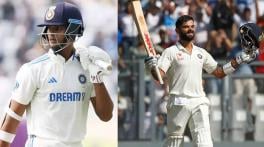'Dream come true': Legends explain the importance of PCB's new domestic cricket structure
'This system looks very good as it is set to promote quality over quantity,' says Shahid Afridi.

The new domestic structure introduced by the Pakistan Cricket Board (PCB) has received the backing of some legendary cricketers.
The PCB unveiled an ambitious and competitive 2019-20 domestic cricket structure, which revolves around the creation of a more quality and intensity focused system to significantly improve first-class cricket and create sustainable success at international level.
Some of the biggest names in Pakistan cricket have now weighed in on the debate surrounding the revamp.
New system has brought clarity: Aaqib Javed

Former Test fast-bowler and head coach of PSL franchise Lahore Qalandars Aaqib Javed, is a fan of the new domestic system, and according to him, the new system is focusing on quality while overcoming the challenges and confusion of the past.
“I have studied the new domestic structure, it is a dream-come-true kind of a situation. Our domestic system was criticised from all quarters in recent years and the reason was that the system was inclined more towards quantity rather than quality. It was really tough to explain to outsiders what our domestic system was and there was a lot of confusion, he said.
“This new system has brought clarity, we know who all would be playing first-class cricket, and, we have also been explained in detail regarding the Second XI cricket. There is a clear pathway for the age group players with the performers graduating to the top-level. Unlike the past, the promotion and relegation would be of players not teams, which is another correct step since you need players, not teams from domestic system.
“A very important aspect in the domestic structure is the facilities, pitches, dressing rooms, ground conditions and balls. The deployment of the Kookaburra ball is a very good development. We have seen in the past that bowlers who used to bowl with Pakistani domestic balls really struggled with Kookaburras at the international level.
“Another major concern that seems to have been overcome is the financial aspect for players. With departments removed from the system, there were doubts about players’ future. However, this new system is offering up to Rs2 million for a season to a player. It is a good start. I wish the very best to PCB, as a coach and former player, I really like the idea.”
Extremely courageous and bold move: Ramiz Raja

Former Pakistan captain and renowned commentator Ramiz Raja has congratulated the PCB on the new domestic system. Ramiz hopes the system will bring meritocracy both in administration and player selection.
“It is an extremely courageous and bold move by the PCB to revamp the domestic structure. The old system was not working and its failings were reflected in our inconsistent performances on the international scene. This new system is very logical with emphasis on city and province based system. Going forward, it would be vital for the PCB to hire capable administrators to run the city based associations, people who don’t have vested interests or indulge in club level politics," he said.
“The associations must be run professionally like the provincial sides, good administration; I feel, is absolute key for success of the system. Former cricketers should also work in administration of the team; similarly, the associations and provinces should be given ownership of selection of players and held accountable. The system has to ensure that talent is not lost due to a poor selection or a personal bias.
“The PCB should also unveil a telecast/broadcast plan to attract sponsors, advertisers and investors. The various competitions identified in the system should be run on Pakistan Super League style or as close to it as possible as it will help create a fan base. If all these aspects are packaged properly this system will flourish for sure. The system is good and it has a lot of potential and should produce superstars for Pakistan cricket.”
New structure will prioritise quality over quantity: Shahid Afridi

Former Pakistan captain Shahid Afridi has backed the new domestic system. Shahid feels the system will once again bring value to first-class cricket and cricketers and it will encourage performers, making them work hard to retain their contracts.
“This system looks very good as it is set to promote quality over quantity. In recent years, first-class cricket was made a little too easy and a lot of first-class players emerged due to the sheer quantity of games. This new system brings back value to a first-class cricketer, which I feel had gone missing with the increase in quantity of players. With only having six teams in the fray, we will surely see a drastic improvement in the quality of the competition," he explained.
“At the same time, players playing these events will have to produce their best all the time and would work really hard to ensure that they retain their contracts. I feel that this system should be given at least three to four years then only we would be able to gauge the merits of the system.
Umpiring standards would improve: Bazid Khan

Bazid Khan, former Test batsman and now a renowned commentator, feels the biggest positive of the new system should be the quality of pitches and also hoped that umpiring standards would improve with greater scrutiny than ever on the match officials.
According to Bazid, the use of the Kookaburra balls is a move which should help narrow the gap between domestic and international cricket.
“The quality of pitches should improve since the matches would be spaced out and you can have the best curators work on the pitches and on the venues. If the pitches are substandard, the curators can be questioned as they won’t have the lack of time excuse anymore. In the past, it was impossible for curators to give sufficient time to pitch preparation due to packed schedules," he said.
“Another advantage is that monitoring the umpires would be easier, rather than 12 odd games at a time, only three first-class matches would be played in a round. As a result, only six teams would be giving reports on umpires’ performance which will make it easier for PCB to keep tabs. I hope more quality over quantity will have a good effect on the standards with the improved scrutiny on the umpires’ performance.
“The change in balls should also help narrow the gap between international and domestic cricket, in the recent past or the last 10-15 years, the condition of the pitches and the balls used was totally different to international cricket which made adjustment to the highest level, a major challenge both for batsmen and bowlers.
“There would be more focus on these games for the mere fact that the number is reduced, the schedule has been announced in advance, giving everyone time to prepare for the games and even if you want to watch the games you know where and when to go.”
Will take up to three years to bear fruit: Rashid Latif

Giving an elaborate assessment of the new domestic system, former Test captain and now an established cricket pundit, Rashid Latif said, the new domestic system is focused on providing more quality, through the new system’s spaced out first-class schedule, the curators will have plenty of time to prepare quality pitches.
“The standard of pitches should improve considerably since the games are spaced out while umpiring will be under more scrutiny than ever which should hopefully help improve this crucial aspect of the game. Umpiring hasn’t been satisfactory in recent times at the domestic level, I hope there is emphasis on maintaining the standard from now on," he said.
“There might be some difficulties at the start, since the teams have lessened and the regions have been merged. Last year, 353 players took part in first-class cricket, while this year, the number should be around 212 including the centrally contracted players for first-class and non-first class games. The competition will be tough and the system will include the best senior and junior players.
“Coaching staff in first and second eleven should be top-class. The head coaches would have a lot at stake and would need to induct solid teams under them which would be a challenge. I feel that the new opportunities for coaching should be available for both NCA coaching staff and the new coaches who will have fresh ideas and approach. The players who are retiring or are on the verge of retirement have a lot to look forward to in terms of coaching opportunities.
“Provincial cricket should succeed but it would require a lot of monitoring, the lower tiers, city-based cricket and age-group selections should be properly monitored and the games should be broadcast or streamed. Selections should be purely on performance in the games rather than the trials system, U13, U16 and U19 are very vital for sustenance of the sport.
“The system will take up to three years to bear fruit, once the teams are picked up by investors/franchises, the financial burden would also ease on the PCB. It is thus vital to ensure that we have quality in the system to attract people. There is hope aplenty and these are exciting times for cricket, if things are done properly and monitored at the same time, the system should provide rich dividends.
“The downside is that the departments have been abolished which is quite a shock for a lot of people. But still it is a big initiative and a lot off effort has gone into making the new structure. I do feel there would be some teething problems yet we would fully support this endeavour while at the same time pointing out the shortcomings. ”














Comments